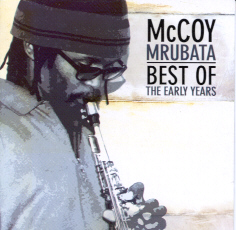McCoy Mrubata - Best Of The Early Years
 When
we study the history of South African Jazz one name will be certainly
mentioned: McCoy Mrubata. McCoy Mrubata is one of South Africa's
finest saxophonists, versatile on the tenor, soprano and alto
saxophones as well as the flute, and has gained recognition
internationally as well. Exposed as a young lion McCoy Mrubata's first
album which is mentioned at All Music Guide is called "Jive Jazz
Collection, Vol. 2: Firebird" and was already released in 1989,
three years after his arrival in Johannesburg. It took eight further
years that he could release his albums "Tears of Joy"
(1997), "Phosa Ngasemva" (1999) and "Indibano"
(1999). This compilation album is a best of these albums. The title
"Best Of The Early Years" sounds like McCoy is a veteran of
jazz music, but he is just 45 years old. So await no dust but
freshness in sound.
When
we study the history of South African Jazz one name will be certainly
mentioned: McCoy Mrubata. McCoy Mrubata is one of South Africa's
finest saxophonists, versatile on the tenor, soprano and alto
saxophones as well as the flute, and has gained recognition
internationally as well. Exposed as a young lion McCoy Mrubata's first
album which is mentioned at All Music Guide is called "Jive Jazz
Collection, Vol. 2: Firebird" and was already released in 1989,
three years after his arrival in Johannesburg. It took eight further
years that he could release his albums "Tears of Joy"
(1997), "Phosa Ngasemva" (1999) and "Indibano"
(1999). This compilation album is a best of these albums. The title
"Best Of The Early Years" sounds like McCoy is a veteran of
jazz music, but he is just 45 years old. So await no dust but
freshness in sound.
The album starts with a track from
his album "Tears of Joy". What I especially like is
the fact that his music isn't dominated by one instrument like most
albums of an instrumentalist but a collaboration of many great
musicians. Sure McCoy plays solos. But his albums are melodious and
all musicians are presenting their own part.
Take for example The
Groove. A nice bass line is introducing into the tune
accompanied by percussion and drums. After a short presentation of
McCoy's sax a great brass section is bridging between the sax solo
line. Johnny Fourie on guitar, Prince Lengosa on trumpet and others
get a place for soloing. That's only in a piece with a playtime of
7:12 minutes. This is life-atmosphere pressed into groove.
Abukho
from his album Phosa Ngasemva is presenting the singer Ringo
Malingozi. Ringo is a Pop singer, a Township Pop singer. Nevertheless
this song is unusual and not representative for his own music. The
song has a social message and is still entertaining. He remembers at
"ubuntu" (humanness). Read more about this
theme here.
Firebird is
a mixture of South African Jive Jazz and Jazz Fusion elements. McCoy
Mrubata combines and opposed both structures. A further prove for his
virtuosity.
Tears of Joy
is featuring Paul Hanmer on
piano, Andre
Abrahamse on bass and Beheki Khoza on guitar besides a big brass
section. The melody is simple, the presentation excellent.
Very dynamic is Fula,
the second excerpt from his album Phosa Ngasemva. Especially the
fretless bass attracts attention. Breathtaking Paul Hanmer's piano
runnings and McCoy Mrubata's sax blow.
Samba in Africa? Yes, Cape
Samba (Tears of Joy). All artists
are performing this Brazilian motive in masterful lightness. Jazz with
easy access.
Mabarane
of his album Indibano showcases that McCoy Mrubata and his band is
still playing in the tradition of Jazz Jive, the traditional Afro
sounds. Certainly one of the reasons for his great popularity besides
his creativity and musical presence when he blows the audience away.
Smooth and
slow characterizes the temper of Blow To
The Head (Firebird). Perhaps an example of smooth jazz made in
South Africa.
Yes, the band can swing. Listen to
The Poet 1. This is primarily the
Straight Ahead side of McCoy Mrubata's group. A further prove for
their versatility.
Phosa
Ngasemva is the expression of South African big band sound. A
big horn section with strong African elements.
Akulalwa
(There's No Sleeping) from the album Firebird is very accessible and
contemporary. Surprising fresh for a 15 years old music.
Qula (Tears
of Joy) is rhythm. Starting as a percussion oriented groove the
tune quickly turns into jazz jive area. Anew Andre Abrahamse's
fretless bass makes this tune to a musical banquet.
Vukani (Wake
Up!) is a journey into jazz fusion and cjazz.
Hopefully McCoy Mrubata gets more
attention in the American music market with pieces like these. By the
way the album Firebird was originally released by BMG/Jive and has
previously been unavailable in South Africa.


